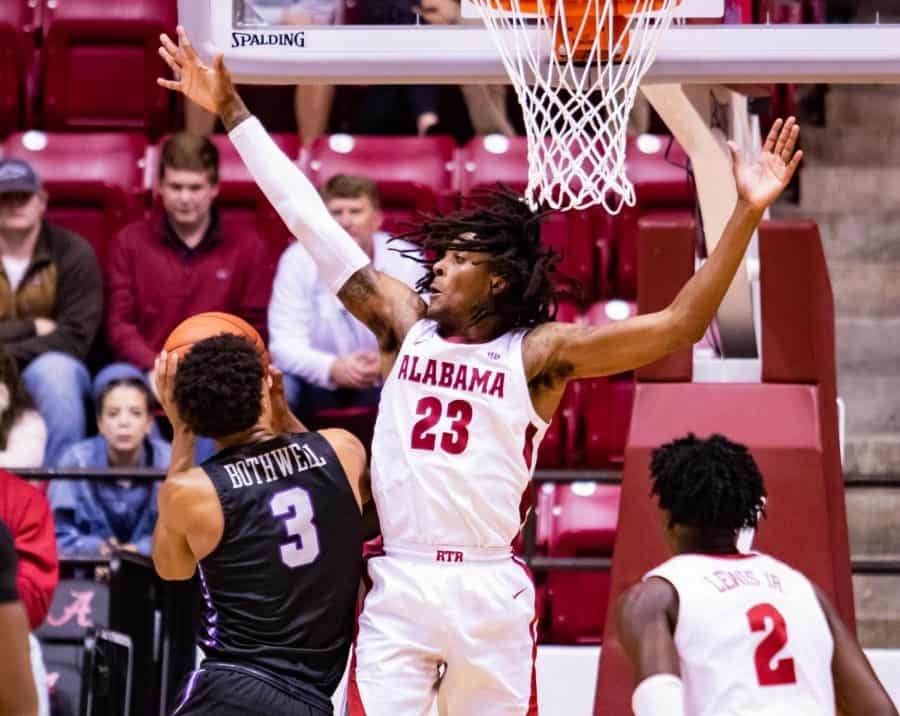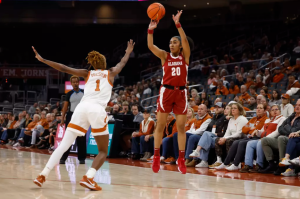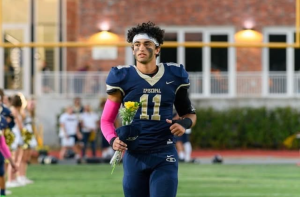John Petty’s defensive improvements to be tested with Herbert Jones out
February 3, 2020
With junior forward Herbert Jones out indefinitely due to a fractured left wrist, Alabama men’s basketball will need someone to step up to replace its top wing defender. The team will be looking no further than junior guard John Petty Jr.
In a season where he is averaging a career high in points (15.4), leading the team in rebounds per game (7.2) and ranks top 10 in the country in 3-point shooting (45.8%), Petty’s defensive improvements have been lost in the mix.
“He has put an emphasis on that side of the ball,” said assistant coach Antoine Pettway, who recruited Petty beginning his freshman year of high school. “What has happened is his offense has gotten even better. First couple of games, his shot wasn’t falling as much, but he just concentrated on being a good defender and kept putting the work in the gym, and now his shot is falling. He’s a really good two-way player.”
Through the Crimson Tide’s first three games of the season, Petty shot 7 of 25 (28%) from the field and 3 of 15 (20%) from beyond the arc, making him average just 7.7 points per game.
Even though his blue-collar points (which measure effort plays) nearly led the team, head coach Nate Oats said that Petty was one of the few players whose blue-collar points did not correlate to higher scoring.
“[When shots aren’t falling], I just continue to play hard,” Petty said. “You know, go get some offensive rebounds, try to get to the free throw line or do whatever it takes on the defensive end to help. That’s been my mindset going into every game this year: playing my best defense.”
But when he scored 16 points while shooting 50% from three against Furman on Nov. 19, there was no talk of his season-high scoring output after the game. It was all about his defensive performance.
Furman forward Clay Mounce had scored 10 points in the first half, but Petty held him to just 3 points after halftime to lead Alabama to an 81-73 victory. Mounce has matched or exceeded 13 points in 13 of his other 22 games this season.
“In that game, he stepped up and wanted to guard [Mounce],” Pettway said. “He’s always wanted to guard the best perimeter player on the other team. You could really tell [against Furman] that it was clicking for him.”
And it was not the final time that Alabama depended on Petty to guard the opponent’s best wing player.
Against Stephen F. Austin on Dec. 6, Jones started the game defending guard Kevon Harris, whose 26 points had led the Lumberjacks to a win at Duke just 10 days prior. After Jones picked up two fouls early and was forced to exit the game, Oats made the tactical decision to let Petty guard Harris, having been impressed by his performance against Mounce.
Even when Jones came back into the game, Petty continued to guard Harris, who scored 10 points, his second-lowest total of the season, on 3-of-16 shooting and turned the ball over four times.
“I think Petty has 100% bought into being a two-way player, playing hard, guarding,” Oats said after the game. “We have challenged him to be one of the top two-way players in the SEC. He’s got the length and the athleticism to be a great defender. … I couldn’t be more proud of the way John has been playing.”
The biggest change that Petty has made is playing with a consistent effort level, which had not been the case in the past two seasons. When Oats first arrived in Tuscaloosa in March, he said he had heard stories about Petty’s wavering effort level from the past coaching staff, and he saw it firsthand when he watched film of last year’s Crimson Tide team.
Now that the junior has established constant effort, it has allowed him to make great strides in his game.
“You don’t have to get on him about playing hard,” Oats said. “You’re just coaching technique stuff like X and O stuff. His basketball IQ is really high. I don’t know how many people know that about him, but he’s really, really smart picking up opponent stuff, running our own stuff.”










